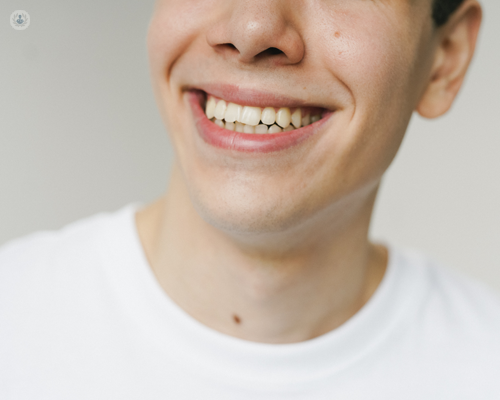The causes of receding gums
Escrito por:Receding gums have an impact on teeth sensitivity as well as aesthetics.
Here to offer an expert take on their causes, how they are diagnosed and addressed, is leading London dentist Dr Sahil Patel.

What are the main causes of receding gums?
Receding gums can be caused by five major factors:
Prior orthodontics
With brace work, ordinarily the gums can recede by 1-2 millimetres or more during brace treatment.
History of gum or periodontal disease
Gum disease affects the structures supporting the teeth; that is the gum and the bone around the gum that can recede if you have gum treatment.
Overzealous brushing
Aggressive brushing is using the toothbrush in a way that is too heavy-handed or with excessive force. This can irritate the gum, making it recede.
Trauma from piercings
Lip and tongue piercings can cause repeated trauma against the gum, causing it to recede.
Dental overloading
This relates to specific bite positions that overload certain teeth, creating a stress around the supporting structures of the teeth, making the gum recede.
If left untreated, what might happen?
Receding gums are a problem from a sensitivity and aesthetic point of view. The first one; sensitivity, relates to the exposed root of the tooth being exposed. This part is typically more sensitive to hot and cold temperatures, and it’s harder to keep clean, so all these things can contribute to pain sensitivity and the need for treatment for correction.
The second one is aesthetic and this relates to the appearance of teeth. After the gum recedes, it exposes the darker part of the root underneath and it also makes the teeth look excessively long and tall. The most severe outcome which is if the recession continues it can make the tooth loose in its socket and eventually the tooth can be lost.
How are receding gums diagnosed?
Receding gums are diagnosed by a general dentist and or specialist periodontist. The classification system varies from country to country and the one commonly used in Europe in the UK is a recession type system - it's a three-grade system from recession type I to type III. One being the mildest three being the most severe.
For certain gum graft treatments recession type, I has the best prognosis for an improvement recession type, II and III usually indicates there's significant bone loss around the teeth and this can actually mean that gum grafts will only ever be partially successful. This isn’t a reason to not have the treatment, but it's worth understanding the limitations and benefits of any gum graft or corrective treatment for gum recession.
Might receding gums lead to throat problems?
Generally speaking, receding gums do not have a direct effect on throat problems. However, receding gums can increase the risk of gum disease and gum issues. This localised infection can spread to other areas of the mouth such as the throat.
How might receding gums affect one's breathing?
Typically, receding gums do not affect one's breathing as these are distinct pathways, although they are both related to the mouth.
If you’re looking for expert treatment for receding gums, arrange an appointment with Dr Patel via his Top Doctors profile.


